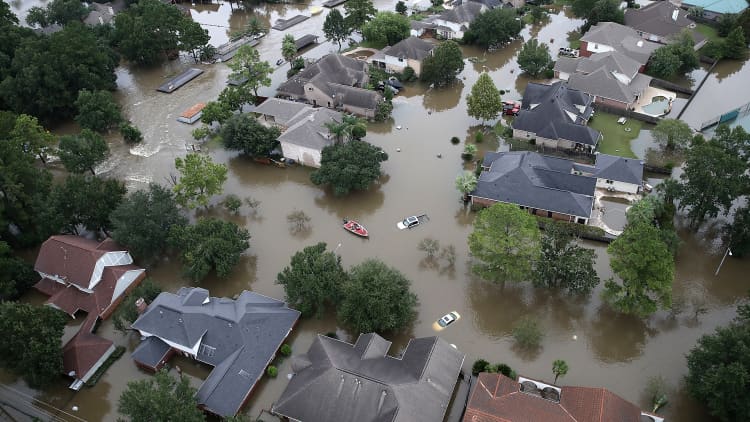After Paul Adams bought his used black Cadillac for $14,000 in 2009, he was able to drive to and from work with his sun roof open. He soaked in the breezy air and palm tree views of Stockton, California.
"The car was beautiful," Adams, 31, said. "Everything was immaculate."
About a month later, the windows started acting up. They wouldn't close or open. Adams spent around $100 to fix the problems. Then the car's lights started flickering. After the electrical system shut down, Adams paid $700 for repairs.
"It was a never-ending battle," he said. One day, while a car mechanic was working on Adams' car he noticed corrosion, a tell-tale sign of water damage.

Adams rechecked the registration and noticed that the vehicle had been in New Orleans in 2005 — the year Hurricane Katrina hit. He had to put the car up for sale online, making sure to be clear: "This car has been through a hurricane." It sold for $4,500.
Cars are rolling computers these days. When water gets as high as it did with Harvey, we're going to see significant damage.John Van Alstattorney at the National Consumer Law Center
Flood damage in cars can take time to surface. And consumer advocates expect a stream of flood-affected cars to enter the market in coming months following hurricanes in Puerto Rico, Texas and Florida. Hurricane Harvey reportedly damaged 500,000 to 1 million cars alone — double the number of vehicles damaged by Katrina.
"Cars are rolling computers these days," said John Van Alst, an attorney at the National Consumer Law Center. "When water gets as high as it did with Harvey, we're going to see significant damage."
So if you plan to buy a used car — and that goes for anywhere in the country, there are steps you should take to make sure you don't drive away in a four-wheeled canoe.
Cars have a record — known as a "vehicle history report." Most states require that the report include a flood or salvage title disclosure for flood-damaged cars. Using the vehicle identification number, located on the driver's side dashboard, you can check the car's history with the National Insurance Crime Bureau, CarFax or the National Motor Vehicle Title Information Center.
"That's an easy way to see if there's already reported damage to the car," Van Alst said, "but you still want to get it inspected."
That's because people are not always honest about their car's history. Some people will rush to sell their car or truck before the flood or salvage title appears on the record. Others, known as "title washers," move cars to states where titling laws are more lenient.
The car was beautiful. Everything was immaculate.Paul Adamsunknowingly bought a flood-damaged car in 2009
"The con artists are going to figure out which states to move their cars to," said Jack Gillis, director of public affairs at the Consumer Federation of America.
If you've found yourself with a defective car, there may still be hope. So-called lemon laws offer legal recourse to people who have bought a malfunctioning car. But since lemon laws generally fault the manufacturer, not every state's protections cover used vehicles. The New York Lemon Law does, while Pennsylvania's does not. Still, it's worth consulting a lawyer because Pennsylvania has other consumer laws that offer rights to used-car buyers.
Van Alst recommends people find an attorney through the National Association of Consumer Advocates. However, "many of the most unscrupulous dealers are thinly capitalized and even if a consumer gets a judgment against them they may have a hard time collecting," he said.
To be sure, some people in search of a good deal might want to buy a flood-damaged car. Perhaps they're confident they can fix any defects that pop up. Car experts say this is a big gamble.
"There's a possibility that if the car got dunked in pure water, it would be OK," Gillis said. "But when a car is flooded in a hurricane, the water is heavily contaminated. You'll have a high level of bacteria in your car. It's stinky and dangerous."

Safety features like airbags may be beyond repair, and the damage from moisture can be insidious and long-lasting, making it hard to even know what parts of the car need fixing.
Here are some simple ways to check for flood damage:
- Check for a musty odor.
- Inspect for dirt or mud stains.
- Open the car's ashtrays, glove boxes and other compartments to see if there are any stains or leftover flood water.
- Check to see if the carpeting or seat coverings seem newer than the vehicle. This could be a sign that they were replaced to cover up the car's past.
- Listen for a "crunchy" sound when you pull the seats forward or back. This could be from sand or dirt that made it into the car during the storm.
- Turn on all power options — windows, locks, wipers, AC — to make sure they work.
- Check for rust or corrosion.
- Look to see if oil or transmission fluid is milky or has beads of water. This could be a sign of water damage.
- Take a test drive and listen for unusual engine or transmission sounds or erratic shifting and acceleration.
These are ongoing precautions people should take long after the storms have passed and a sense of normalcy has returned.
"There are still cars being sold today from Katrina," Adams said.


